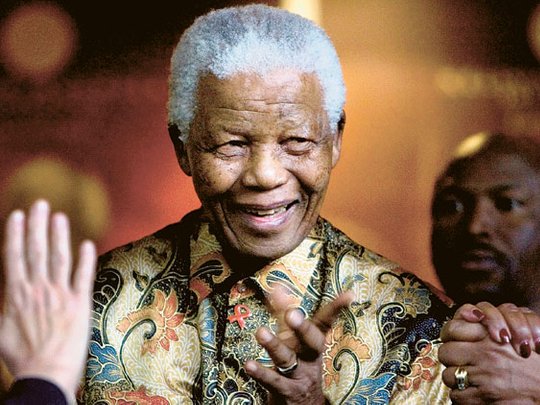
Dubai: It seems as if it was just yesterday, not 23 years ago.
It was early February 1990 when my young half-Arab, half-German neighbour entered her home shouting with joy, “Mandela Free, Mandela Free.”
She had just come back from a ride she took with her friends to salute the release of a man who later proved to the world how great he was.
Nelson Mandela, who was imprisoned for nearly 27 years, has admirers around the world, not just in his country.
The more I read about him, the more I feel sorry for not having a chance to meet him in person — let alone interview him.
Much has been said and written, and several movies have been produced about him — all shedding light on the icon’s character and thoughts.
One of his most fascinating and strongest decisions, in my opinion, was his disinterest in running for a second term in presidency after serving the first one, which ended in 1999.
Coming from a region where four Arab presidents were toppled in a series of revolutions by their people after serving a minimum of 30 years, I can’t show enough respect for such a choice by a man who advocates democracy like Mandela — though I am sure if he ran for more than one term he would have won easily. I am also confident if he opted to run for any global position, he would have had the support effortlessly.
But he didn’t show interest. After long years of suffering, he could have enjoyed the pleasure of power, but he is a strong believer in his ideals, and he practised what he preached.
Mandela decided to retire from politics after the first term. Yet, he continues to be influential with his words and the causes he supports.
Throughout the latest two decades of his life, I think he fully realises that his words are like jewels, and that he could have made a fortune through public appearances and speeches.
Yet, he opted to focus on charity work after retiring from public life — this is the type of behaviour that we are not really used to in the developing countries, unfortunately.
He was praised and honoured,receiving local and international acclaim, which was crowned by receiving a joint Nobel Peace Prize with F. W. de Klerk, the South African president who was equally praised for his vision and had the courage to take a dramatic decision of unconditionally releasing Mandela from prison and legalising all formerly banned political parties on February 2, 1990.
Mandela also made a similarly smart move — which even Hollywood opted to keep as a record.
When the great leader inherited ruling of a country coming out of apartheid, he looked around for something that could bring a divided nation together. Nothing could be more than a sport.
Invictus tells not only the story of South Africa winning the Rugby World Cup in 1995, but it also tells side of a man who spent almost one-third of his life in prison, but was willing to forgive when he became a free man.












